Chef Crafted Food Starts Here…



Sandridge Crafted Foods® has earned its place as a leader in chef-crafted food for a reason. It’s our continuing investment in our people and culture – from chefs and food scientists to those who craft and deliver our products – and cutting-edge processes that ensure you always get the highest quality, freshest products on your shelves, in your commercial kitchens, and on the table to delight your customers.




Sandridge Crafted Foods is proud to be a third generation, family owned and operated leader in the fresh food industry. When Vincent R. Sandridge started the company in 1960, he sold deli meats in vacuumed retail pouches. His hard work and ambition enabled us to expand into the cold salad business a few years later. With over 60 years of experience, we are one of the most trusted names in the industry for developing and manufacturing complete meal solutions.
Vincent’s son, Mark D. Sandridge, joined the company in 1976 and focused his energy on food science, development, and innovation. Michael S. Sandridge, Vincent’s youngest son, joined the organization a decade later and directed his efforts toward developing long-lasting customer relationships.
Mark purchased the company in 1997 and became CEO. His background in food science and visionary approach expanded our manufacturing capabilities to include kettle soup and sauce production, and sous vide cooking. Additionally, a huge investment was made to bring High-Pressure Processing (HPP) into our facility to help differentiate ourselves in an increasingly competitive field. These resources helped pave the way for countless opportunities and transformative growth.
For two decades, Mark’s sons, Jordan D. Sandridge and Dane V. Sandridge, have worked closely with their father to implement new technologies, streamline operations, craft new and exciting recipes, and position themselves as leaders in both manufacturing and innovation to guide the company into the future. Today, we have multiple locations and nearly 1,000 valued employees helping to drive our success! The Sandridge family takes pride in all that has been achieved and looks forward to continuing to grow together.

Vincent Sandridge started his entrepreneurial journey by partnering with the Buddig Family, owners of Buddig Meats. They proposed that Vince manage the direct-to-store distribution services of their vacuum sealed lunchmeat products.
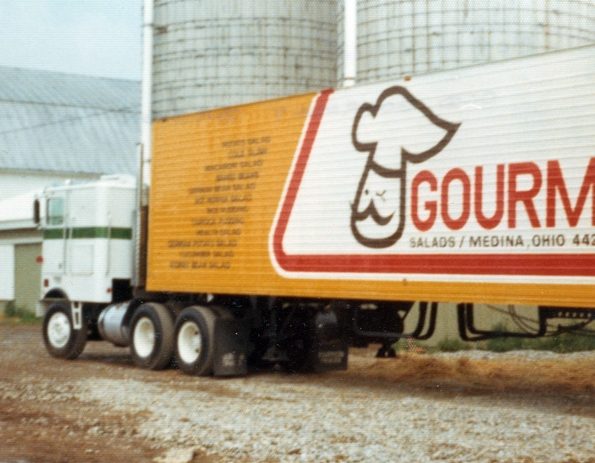
Vincent purchased Gourmet Salads and incorporated his family name and existing business under Sandridge Gourmet Salads. He originally manufactured and sold salad products out of his home in Cuyahoga Falls, Ohio.

Vincent moved forward with the largest investment in the company up to this point in time by building the Sandridge Gourmet Salad 10,000 sq. ft. manufacturing site on Lafayette Road in Medina, Ohio.

Mark Sandridge joined the company in 1976 and has served as CEO since 1997. A Food Science graduate from The Ohio State University, he is recognized as an industry innovator. Today, he focuses on talent development, mentoring employees to drive the company’s next generation of growth.
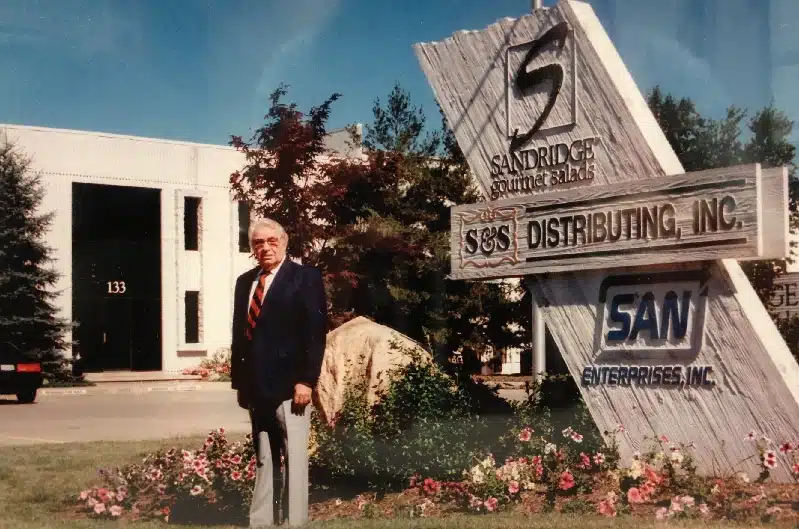
Increase in demand and popularity of prepared fresh salads required a larger manufacturing facility. Vincent built the 20,000 sq. ft. site on Commerce Drive in Medina, Ohio as an enduring symbol of commitment to producing the highest quality products.

Sandridge® purchased the Melch’s® Brand to further expand the product portfolio in the Midwest. Melch’s consisted of fresh, ready-to-serve Amish-style potato salad, macaroni salad and cole slaw.

Michael Sandridge, Vince’s youngest son, joined the company as a sales rep in 1986 after attending Kent State. Rising to VP of Sales, he built strong customer relationships, drove major foodservice growth, and helped expand the company’s customer base through his deep care for customers and consumers.

Sandridge® established its now iconic legacy brand, Grandma’s®, which is proudly sold to more than 80 different foodservice and retail businesses throughout the country.

Sandridge® made the strategic move into the fresh soup industry. This was part of a seasonal growth focus allowing the company to fill capacity during non-peak salad season.
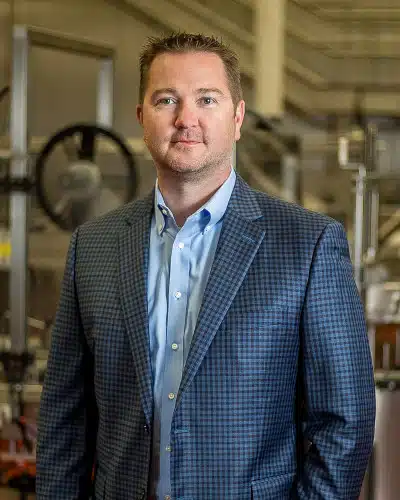
The Sandridge® story continues with Mark’s son, Jordan, who joined after graduating from The Ohio State University. He held several operational leadership roles, including with MDS Inc., before becoming COO in 2020. He later earned his MBA from Ohio State’s Fisher College of Business.
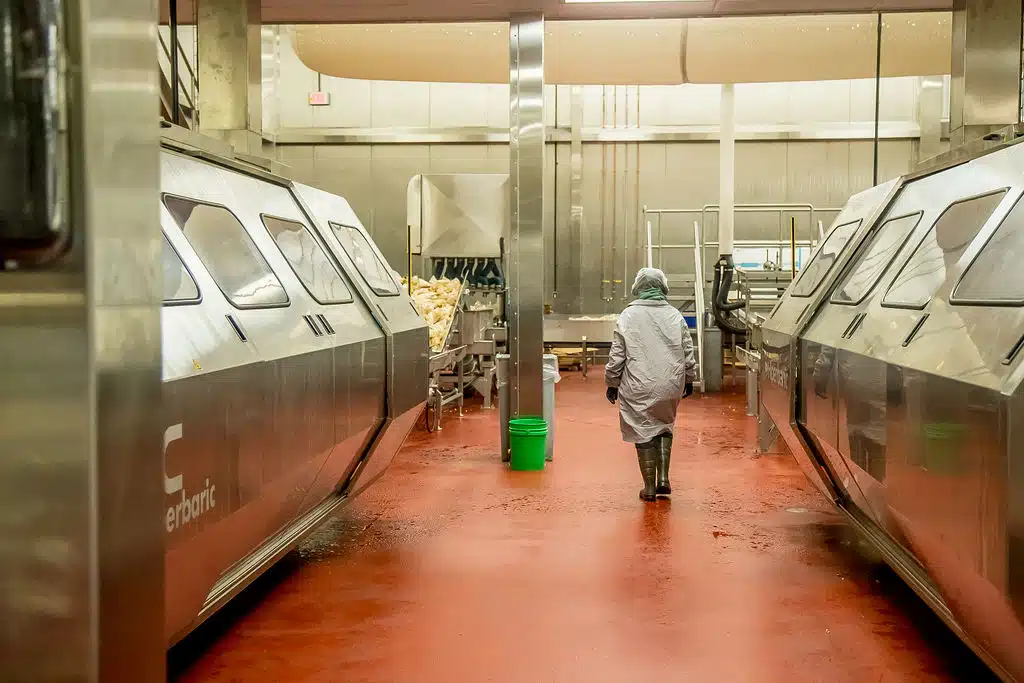
Sandridge® invested in two High Pressure Processing (HPP) lines as a proactive response to consumer demands. HPP enables us to extend the shelf life of many products without the need for preservatives.

Dane Sandridge, Mark’s youngest son, joined the company with an Economics degree from Wittenberg and a Culinary Arts degree from the CIA. He led innovation strategy, managed key accounts, and the marketing team before becoming Chief Commercial Officer in 2021.

Sandridge® acquired RMH Foods in Morton, Illinois to relocate their protein cooking operations and begin leveraging the benefits of sous vide cooking – further enhancing the quality food that customers have come to rely on and appreciate.
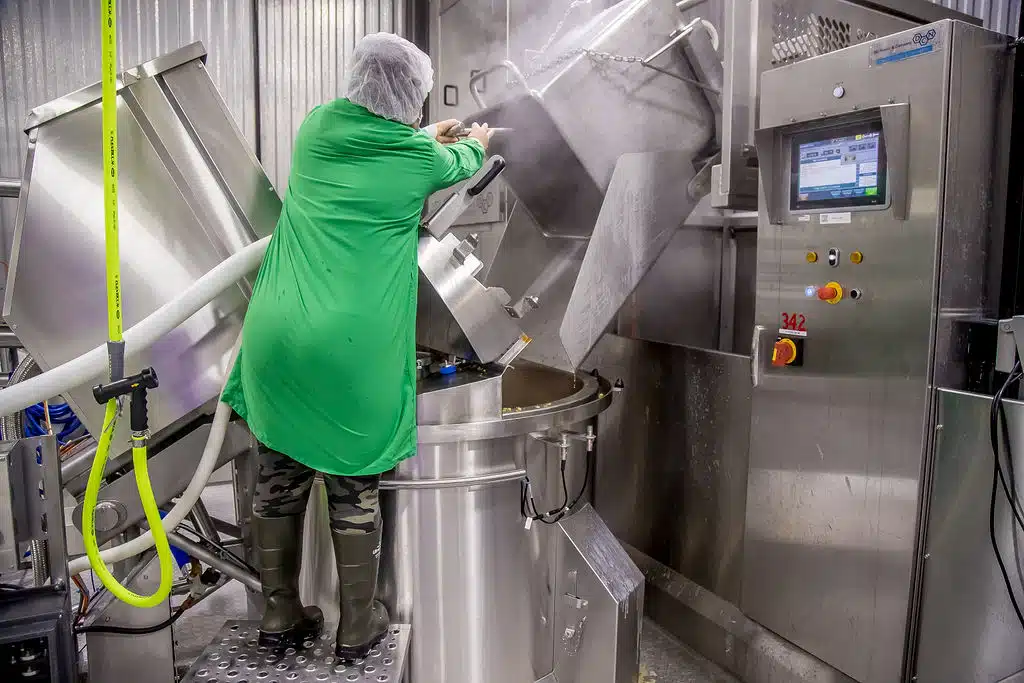
Sandridge® invests in kettle cooking equipment. This European technology enables our culinarians to develop the right product for the right application. It also allows them to layer flavors making soups and sauces that are healthier and more flavorful.

Sandridge Food Corporation elevates Jordan Sandridge and Dane Sandridge to the positions of Co-President, passing the torch of company leadership to the third-generation of the Sandridge family.

Sandridge® rebrands as Sandridge Crafted Foods® to better reflect the company’s purpose statement; to foster community and human connection through Remarkably Fresh, Chef-Crafted Foods. Our new name and identity bring forth the crafted quality that goes into everything we produce for our customers, clients and the industry. Chef-Crafted Foods Start Here.
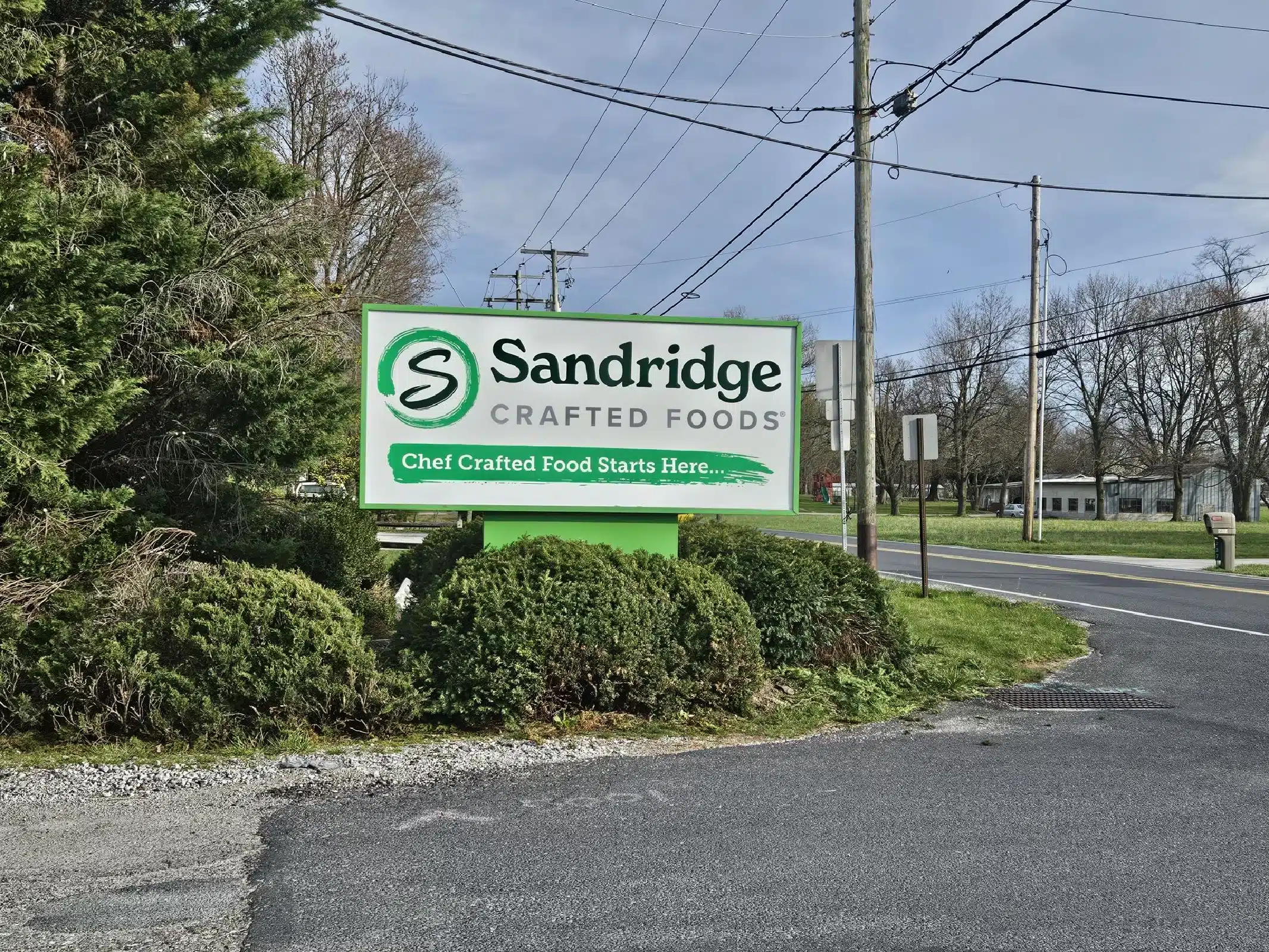
Sandridge Crafted Foods completed the acquisition of a new production site in New Oxford, PA, a strategic move to increase our production capacity and market presence in the Continental U.S.

In 2024, we updated our iconic brand from Grandma’s Original Recipes to Grandma’s Kitchen®, creating a modern feel that will resonate with customers for generations to come.

Sandridge launched a new retail product line called Simply Crafted™, consisting of sous vide proteins and soups, in partnership with Folds of Honor.

Mark Sandridge became CEO of Sandridge Crafted Foods in 1997, when he bought the business from his father, Vincent R. Sandridge. He has overseen the company’s evolution from a seasonal “wet salads” business to its current position as a leading provider of fresh soups, sauces, salads, sides, and proteins to the retail and foodservice industries.
Mark has always been highly involved in all aspects of the business, but his primary focus today is talent development. He actively works on the methodical succession of the business to its third generation of family leadership, his sons Jordan and Dane, while also leading a companywide program to identify and mentor talented employees for future growth.
“I’ve always wanted this company to be a place that people are eager to work for. We have been pretty good at attracting and growing young talent within our organization. Seeing people succeed in this business is really what has motivated me over the long haul.”
He attributes the company’s growth over the past two decades to listening to customers. “We were challenged to make food that tasted better and lasted longer without chemicals, and that’s the goal we set for ourselves. I’m a food scientist by training, and I continue to be a student of the industry.”
In his spare time, Mark enjoys racing sportscars, golfing, traveling to the UK and spending time with his grandchildren.
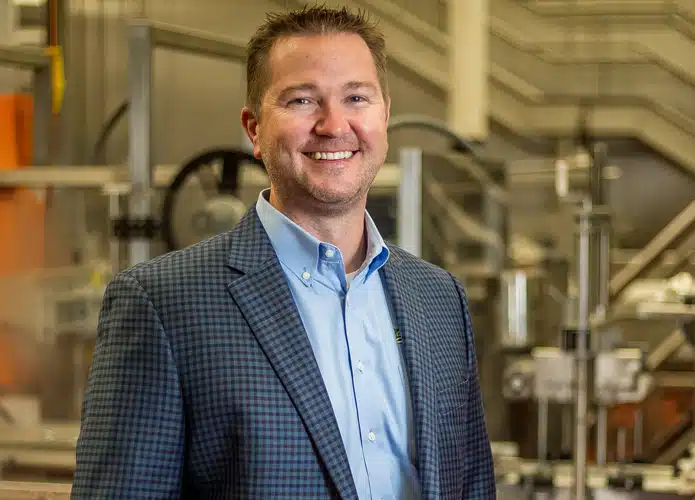
Jordan Sandridge is Co-President of Sandridge Crafted Foods, overseeing operations, maintenance, logistics, and the company’s Morton, IL production facility.
When Jordan was a student, he worked summer jobs at the family business and began his full-time career with the company in 2004, after earning a bachelor’s degree in food science and technology from The Ohio State University. He went on to get his MBA from The Ohio State Fisher College of Business in 2015.
He held a wide range of positions as the company evolved, including running the vegetable preparation and slaw line, serving as project manager for the launch of the company’s retail soup line, receiving manager, business manager, warehouse manager, and general manager of the company’s in-house logistics arm, MDS Inc. Prior to being named Co-President in 2022, Jordan was Chief Operating Officer.
“It’s humbling to see how much we’ve changed and grown in the time I’ve been here. What I value most is the 600 people I work with every day. They’re my work family, and they’re extremely important to me.”
Sandridge grew up in Westfield Center, Ohio and still lives there with his wife Bethany, two sons, and two dogs.

Dane Sandridge is Co-President of Sandridge Crafted Foods, overseeing the company’s sales, innovation, and marketing teams. He works closely with customers to facilitate the intricate process of bringing new products to market.
Dane joined the company in 2008 as a financial analyst, after earning a bachelor’s degree in economics from Wittenberg University. In 2010, he began a two-year leave of absence to study at the Culinary Institute of America, where he earned an AOS degree in culinary arts.
Upon returning to the family business, he served as a regional sales manager and was promoted to Vice President of Innovation in 2016, when the company was experimenting aggressively with new applications as part of a growth strategy to expand beyond the heritage salads business. Prior to being named Co-President in 2022, he served the company’s Chief Commercial Officer.
“Today, we have the culinary capabilities to complete an entire plate of food. And not just any plate – a world-class plate! In the salad world it was pretty simple, we were the company that got invited to a picnic. Now there are so many more opportunities, and it’s elevated the way we collaborate and communicate – internally and externally.”
He and his wife, Kayla, live in Wadsworth, Ohio with their children Emersyn and Grayson. Dane is an avid golfer but would prefer going on adventures with his family.

Michael Sandridge is EVP of Strategic Customer Accounts at Sandridge Crafted Foods and is the younger son of company founder, Vincent R. Sandridge.
Throughout his life, Michael has pursued varied opportunities inside and outside of the company. Beginning in 1986, he spent 10 years in plant operations and then took the lead role in the company’s foodservice division where he maintains the Sandridge tradition of solution-building that his father established from the beginning.
“Success goes beyond great products – it’s built on strong relationships with our customers and the communities we serve, who both share in and shape our growth.”
Michael and his wife Kim live in Granger Township where they enjoy spending time with their kids and grandkids. Family has always been Michael’s top priority and he cherishes the opportunity to work alongside his brother and nephews daily.

Todd Jones, CPA, joined Sandridge Crafted Foods in 2019 as Chief Financial Officer and Vice President of Finance. He is also responsible for the company’s IT department.
Todd is part of a management team charged with facilitating the transition to a third generation of Sandridge family leadership upon the eventual retirement of CEO Mark Sandridge.
His previous experience includes CFO at Thorworks Industries, an Ohio-based manufacturer of protective coatings; and partner, CFO and COO for Clinton Aluminum, a leading Midwest distributor of aluminum and stainless steel, he was also a partner at a regional accounting firm.
An Akron native, Todd earned his bachelor’s degree in accounting at the University of Akron, with additional coursework in its Masters of Taxation program.
He and his wife Missy live in Doylestown, Ohio. They have six grown children.

With more than 20 years of experience in Human Resources, Nicole leads our HR team with heart and strategy – focusing on organizational design, workforce planning, and talent development that support both business goals and team member well-being.
Before joining Sandridge, Nicole held leadership roles at GOJO, Heinz, Kraft Heinz, and Evoqua Water Technologies. She’s a certified Lean Six Sigma practitioner and a trusted coach, known for building high-performing, engaged teams.
Nicole earned her BBA in Human Resources and Health Systems from the University of Mount Union. She finds her greatest inspiration in her husband and their two children, and outside of work, she loves spending time cooking, reading, and wake surfing with her family.

Rick Sisko is Chief Strategy Officer of Sandridge Crafted Foods and is responsible for corporate strategy and people development across the company’s primary business units. He moved into the role in 2022, after seven years as the company’s President. Rick serves on a management team charged with transitioning his previous responsibilities to the third-generation of Sandridge family leadership.
Before coming to Sandridge, Rick was CFO at Meier Holding LLC, which operated industrial supply businesses in Ohio and throughout the Southeast US.
Rick is a graduate of the University of Cincinnati, with a Bachelor of Business Administration degree in accounting. He and his wife Rhonda live in North Royalton, OH, where they raised three now-grown children.
Outside of work, he serves on the board of the Medina County Port Authority and enjoys health and fitness, an occasional round of golf, and traveling to warm climates.

Tiffany Testa is the Executive Vice President of Marketing & Innovation at Sandridge Crafted Foods. She was hired in 2019 to lead strategic and innovative marketing to develop a meaningful brand experience for every Sandridge customer.
Tiffany’s leadership has evolved the role of Marketing at Sandridge from one focused on brand marketing to one that includes technology, strategy, corporate social responsibility, and nearly everything else the business touches.
Tiffany has a bachelor’s degree in speech communications from Baldwin Wallace University and earned her MBA from Ashland University’s Dauch College of Business and Economics. In 2014, she returned to school to study leadership and appreciative inquiry at Case Western Reserve University. She sits on the board of Goodwill Industries serving Summit, Portage, Medina, Ashland, and Richland Counties.
Tiffany lives in Portage Lakes, Ohio with her husband and three children. She’s an adventurous foodie, has a passion for fitness, and leads a highly active lifestyle!

Aaron Hough is the Senior Vice President of Operations at Sandridge Crafted Foods where he oversees all aspects of the company’s operational strategy, ensuring seamless execution, and exceptional service to clients nationwide.
With over two decades of experience in operations management and continuous improvement, Aaron brings a wealth of expertise to his role. As a natural problem-solver and collaborative leader, he is passionate about building high-performing teams and fostering a culture of accountability and professional growth.
Aaron holds a Bachelor of Science degree in Mechanical Engineering from the University of Dayton and continues to stay on top of emerging trends and best practices through ongoing professional development. He also serves as a mentor to aspiring professionals.
Outside of work, Aaron operates H. Estates Farm at his home in Springfield, Ohio where he grows pumpkins, sweet corn, concord grapes, and watermelons with his wife, their three dogs, and two farm cats. He is an avid fisherman, outdoor enthusiast, and a record-setting power lifter.

Don Hubert is the Vice President of Sales at Sandridge Crafted Foods. He began his career with the company as seasonal help when he was in college. In 1996, Don made the decision to come on board full-time working for the distribution side of the business and moved to the manufacturing side one year later, where he worked as a shipping supervisor. In 2001, he joined the sales team where his focus was calling on retail and foodservice accounts.
Don graduated from Walsh University with a Bachelor of Arts in Business Management. He lives in Green, Ohio with his wife and two kids.
Outside of work, when Don’s not watching his children participate in their sporting events, he enjoys being outdoors, hunting, fishing, and golfing.

Dr. Dale Fortner is Vice President, Talent & Organizational Development at Sandridge Crafted Foods. His role includes leadership development, personnel coaching, and community and government relations.
Under Dr. Fortner’s guidance, the company provides programs to help employees achieve their professional and personal goals, resources to support financial and mental health plus other often-overlooked needs. We also have “culture coordinators” to facilitate the Sandridge commitment to an employee-centered culture. “We strive to be a caring, supportive environment where people enjoy coming to work. We want them to view their career at Sandridge as a long-term path where they’re learning, contributing, and making a difference.”
Dr. Fortner earned a bachelor’s degree in English from The College of Wooster; a master’s in education from The University of Akron; and a doctorate in Administrative Leadership for Teaching and Learning at Walden University, Minneapolis.
He and his wife live in Wadsworth where they raised five daughters.

Steve Mesia is the Vice President of Food Safety and Quality Assurance at Sandridge Crafted Foods. He was hired in 2023 to oversee the food safety and quality programs to ensure safe, high-quality food for every Sandridge customer.
Steve has his bachelor’s degree in Organic Chemistry with a minor in Microbiology from Bemidji State University and is CMQ/OE certified through the American Society for Quality. He brings over 37 years of food industry quality management experience to Sandridge through his career in both large-scale and startup food businesses.
Steve and his wife live in Spencer, OH as empty nesters; their four children are scattered across the U.S. and abroad. When he’s not at work, he’s either working on his home, or traveling to see his kids.

Matt Hawks is the Sr. Director of Supply Chain at Sandridge Crafted Foods. He started his career working part-time in the shipping department while getting his bachelor’s in political science from Walsh University. He was brought on full-time in 2011 and worked various roles in multiple departments, giving him thorough knowledge of the company’s operations.
Matt is currently in the process of attaining his master’s degree in supply chain management from the Fisher School of Business at The Ohio State University.
Matt resides in Westfield Center with his wife, Carly, and their two young kids, Raegan and Rhett.

Our business is firmly grounded in values we live every day. And they make a real difference for our customers, the people they serve and our employees.

We believe that great food brings people together and make moments memorable.
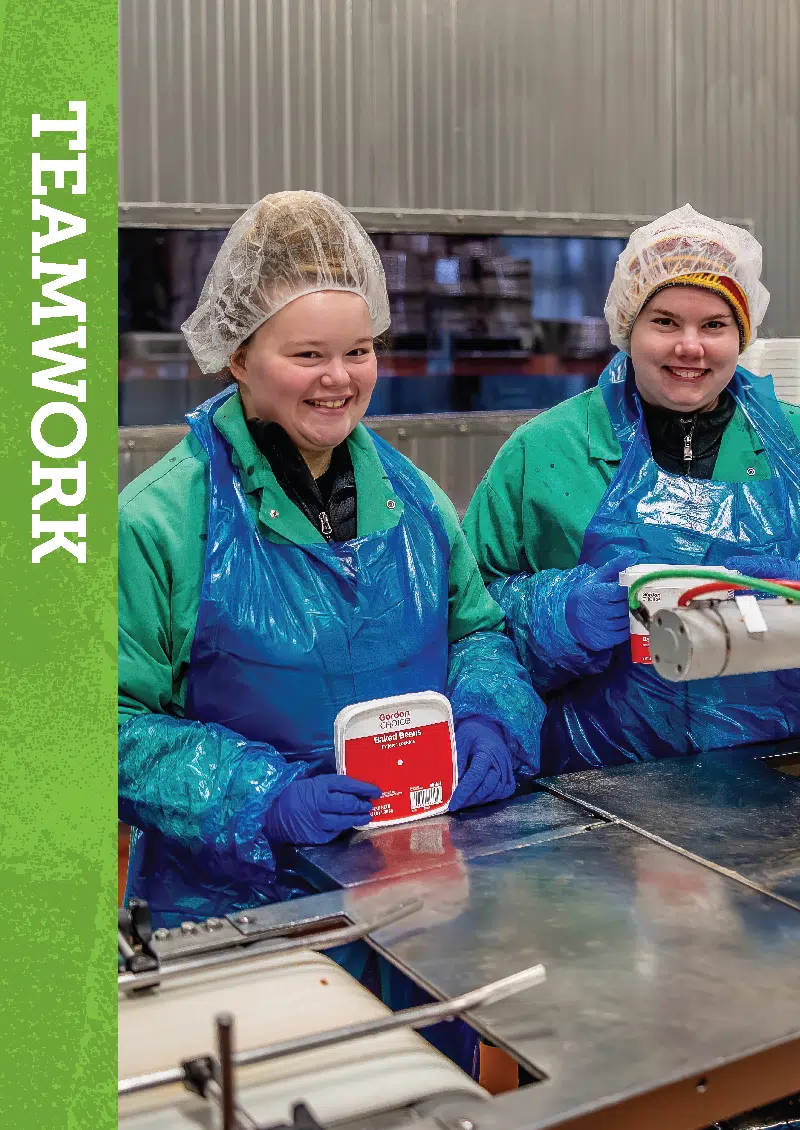
We’ve built an inspired and diversely skilled team united by the values we share and driven by a passion for excellence in everything we do.

Quality, freshness and food safety is imperative in today’s climate. Whether co-packing, private labeling or sold under our own brand, you can count on quality control and food safety.

We’re moving at the speed of fresh with state-of-the art processes to innovate, create and deliver exceptional food value to our customers.
Sandridge Crafted Foods is proud to be a leading job-creator in Northeast Ohio, North Central Illinois, and Southeastern Pennsylvania.
We also strive to make a positive difference in these communities by helping ease food insecurity through regular food donations to organizations that support ending hunger for the youth, senior citizens, and disadvantaged populations.
Our ongoing relationships with the organizations on this page help our donations reach those who need it most. Click on any logo to find out more about the organization and volunteer/donation opportunities.



















As the largest consumer of water in Medina County, Sandridge works diligently to use water in a way that meets current ecological, social, and economic needs without compromising the ability to meet those needs in the future. This includes regular daily monitoring of in-flow and out-flow pH levels and screening for any potential contaminants that could harm the environment. Sandridge works closely with the Medina County Sanitary Engineering Department to ensure that water quality and safety are a top priority.
Sandridge has converted production facilities and warehouses from metal halide fixtures to energy efficient LED and T5 high bay warehouse lighting.
Motion sensors were also installed resulting in energy savings up to 70%, effectively producing nearly twice the light using half the energy.
Last year (2023) Sandridge sent 1,412,840 pounds of food waste to local farms to use as feed for livestock. Using food waste can help farmers reduce feed costs while helping Sandridge reduce disposal costs and minimize the environmental impacts of this waste.
Sandridge also sent 2.7 million pounds of food waste to Northeast Ohio solid-waste processors for use in anaerobic digestion facilities. This cutting-edge process allows bacteria to turn food waste into useful resources such as fertilizers and bio-fuel.
Sandridge runs a fleet of 30 trucks that have implemented fuel-efficiency standards to minimize the impact on the environment.
– California emissions standards.
– FlowBelow – To reduce wind resistance and improve fuel economy.
– Super Single Tires – Only one tire per axle vs. two to reduce weight and improve efficiency.
Last year (2023) Sandridge Crafted Foods sent 6,252,181 pounds (3,126.09 tons) of recyclable waste items to processing facilities across Northeast Ohio. Recycling conserves natural resources, protects natural ecosystems, and encourages biological diversity – enhancing the long run sustainability of the biosphere.
Sandridge continues to increase the amount of waste that is recycled rather than sent to local landfills year-over-year.
The Sandridge family believes that good food is the foundation of genuine happiness. May lasting memories be made with good friends and perhaps most importantly great food. Our family is committed to carrying on the traditions that help bring your family together. Enjoy life, it’s delicious!


